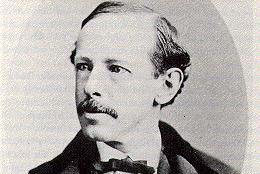By Jen Colletta

Exclusively for Between The Lines
National Gay History Project
While writer Horatio Alger Jr.'s work has come to symbolize the "rags to riches" possibilities of the post-Civil War 19th-century American dream, his stories were also an outlet for his own desires and frustrations -fueled by his probable life in the closet.
Alger lived from 1832-99 and was most prolific in the years immediately following the Civil War, focusing most of his stories about and geared toward young males.
Nearly all of his books contained a plotline in which a young boy -economically poor but rich in morals and fortitude -advances in life due to perseverance and dedication, popularizing the notion of the "self-made man" in a post-war era longing for stability and future promise.
However, in all of his stories, the young protagonist isn't completely "self-made" -but rather is guided by an older man, a possible literary exploration of Alger's own yearning for same-sex connection.
While Alger never averred he was gay, prior to his public writing career he was embroiled in a sex scandal with two teen boys.
At the time, shortly after the war in 1866, Alger was working as a Unitarian minister, having followed in his father's footsteps, in Brewster, Mass., but was forced to resign -and to move out of town to New York City -after being accused of "the abominable and revolting crime of unnatural familiarity with boys," as put in a letter from congregation leaders detailing the incident to the American Unitarian Association in Boston.
According to "Brewster Revisited" by Bill and Mary Roach, church officials said Alger was accused of engaging in unnamed sex acts with 13-year-old John Clark and 15-year-old Thomas Crocker, which the church said were "too revolting to relate," but which many scholars have since interpreted to likely mean he was accused of performing oral sex on the teens.
The church documents also suggested that there may have been other boys with whom Alger was involved, but these were the only cases that came before the church's investigating committee, to which Alger did not confirm or deny the charges but only admitted he had acted "imprudent" -although the cases were never brought before the full parish committee for a hearing that would have included witness testimony.
"There are no other incidents besides this one that we know about," said Robert Kasper, executive director of the Horatio Alger Society. "He probably was a latent homosexual but there were no other cases or incidents that were proven beyond this one-time thing."
In light of his possible transgression in Brewster, Alger's literary focus on adolescent boys raises the question of whether or not he was a pedophile.
Dr. James Martel, a San Francisco State University professor and author of "Horatio Alger and the Closeting of the Self-Made Man," proffered that while he believed that could be the case, he considered his homosexuality was separate and that the writer was also attracted to adult males.
Delving into his vast body of work provides further illumination of Alger's sexuality, Martel said.
"Whatever he did in his personal life we're not sure, but I believe he sublimated his desire for boys into a kind of economic desire, suggesting that he thought success could be built upon the sublimation of gay tendencies," Martel explained, noting that Alger's career prospered largely from the large collection of more than 100 juvenile stories, which focused on young boys. "That's fascinating because it suggests that he thought not so much being gay, but being closeted, was the basis for the so-called self-made man."
That idea is also found within the pages of his novels.
"The stereotype of his stories is that young boys rise up by their bootstraps through hard work and honesty but in every story, the handsome, young boy is discovered by a rich older man who takes him under his wing and through his patronage becomes successful," he said. "But the older man's involvement is itself somewhat closeted so that it makes it seem like the boy is a 'self-made man.'"
Alger's stories are nearly devoid of female characters and also illustrate a seeming disdain for men who do not embrace typical masculine ideations -a possible incarnation of his self-hatred stemming from a life in the closet.
Alger's sexuality has become a commonly accepted biographical element among contemporary scholars, although that was not always the case.
Details of the Brewster incident were not circulated until the latter half of the 20th century, and a 1920s work that was long considered to be the definitive Alger biography by Herbert Mayes -and that included references to numerous sexual endeavors with women -was later revealed by the author to have been a hoax.
Just as understandings of Alger's life have transformed over the years, so too have interpretations of his work.
At the time of their publication, the stories, Kasper said, were largely considered to be simply entertainment for young readers.
"The whole rags-to-riches theme is more of a 20th century interpretation because when he wrote the books, they were basically seen just as children's books," he said.
However, over time, the concepts that Alger's plots introduced to American society were integral in providing a new vision for success as America transitioned from post-Civil War era into the Gilded Age.
"He gave a voice to the idea of the self-made man and that became a part of the ideology of American society; however, he also showed that becoming a self-made man isn't necessarily about actually being 'self-made,' but rather it's about connections, class and relationships across class -and there was a queer heart at the bottom of that mainstream American experience," Martel said. "That ideology probably doesn't apply much anymore because we're in a much different, globalized society and the American dream has moved on from that. But at the time he gave a surface ideological form to the idea of American success but also conveyed some hidden, inner secrets about how to be successful."










